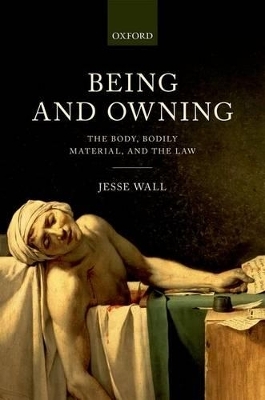
Being and Owning
The Body, Bodily Material, and the Law
Seiten
2015
Oxford University Press (Verlag)
978-0-19-872798-9 (ISBN)
Oxford University Press (Verlag)
978-0-19-872798-9 (ISBN)
Disputes over the use and storage of bodily material continue to arise but the law has no clear answer as to the legal status of bodily material. This book develops a way for the law to address disputes over the use and storage of bodily material that, contrary to the current trend, resists the application of property law.
When part of a person's body is separated from them, or when a person dies, it is unclear what legal status the item of bodily material is able to obtain. A 'no property rule' which states that there is no property in the human body was first recorded in an English judgment in 1882. Claims based on property rights in the human body and its parts have failed on the basis that the human body is not the subject of property. Despite a recent series of exceptions to the 'no property rule', the law still has no clear answer as to the legal status of the body or its material. In this book, Wall examines the appropriate legal status of bodily material, and in doing so, develops a way for the law to address disputes over the use and storage of bodily material that, contrary to the current trend, resists the application of property law.
Wall assesses when a person ought to be able to possess, control, use, or profit from, his or her own bodily material or the bodily material of another person. Bodily material may be valuable because it retains a functional unity with the body or is a material resource that is in short supply. With this in mind, Wall measures the extent to which property law can represent the rights and duties that protects the entitlement that a person may exercise in bodily material, and identifies the limits to the appropriate application of property law. An alternative to property law is developed with reference to the right of bodily integrity and the right to privacy.
When part of a person's body is separated from them, or when a person dies, it is unclear what legal status the item of bodily material is able to obtain. A 'no property rule' which states that there is no property in the human body was first recorded in an English judgment in 1882. Claims based on property rights in the human body and its parts have failed on the basis that the human body is not the subject of property. Despite a recent series of exceptions to the 'no property rule', the law still has no clear answer as to the legal status of the body or its material. In this book, Wall examines the appropriate legal status of bodily material, and in doing so, develops a way for the law to address disputes over the use and storage of bodily material that, contrary to the current trend, resists the application of property law.
Wall assesses when a person ought to be able to possess, control, use, or profit from, his or her own bodily material or the bodily material of another person. Bodily material may be valuable because it retains a functional unity with the body or is a material resource that is in short supply. With this in mind, Wall measures the extent to which property law can represent the rights and duties that protects the entitlement that a person may exercise in bodily material, and identifies the limits to the appropriate application of property law. An alternative to property law is developed with reference to the right of bodily integrity and the right to privacy.
Jesse Wall is a Lecturer in the Faculty of Law at the University of Otago. He was a Lecturer and Junior Research Fellow at Merton College, Oxford. He was awarded a Rhodes scholarship to undertake studies at Pembroke College, Oxford, where he completed a B.C.L, M.Phil, and D.Phil.
Introduction ; 1. The Ownership of Bodily Material ; 2. The Objectification of Bodily Material ; 3. The Commodification of Bodily Material ; 4. The Concept of Property Law ; 5. The Structure of Property Law ; 6. The Limits of Property Law ; Conclusion
| Erscheint lt. Verlag | 2.7.2015 |
|---|---|
| Verlagsort | Oxford |
| Sprache | englisch |
| Maße | 162 x 240 mm |
| Gewicht | 536 g |
| Themenwelt | Geisteswissenschaften ► Philosophie ► Ethik |
| Recht / Steuern ► EU / Internationales Recht | |
| Recht / Steuern ► Öffentliches Recht ► Verfassungsrecht | |
| Recht / Steuern ► Privatrecht / Bürgerliches Recht ► Medizinrecht | |
| Recht / Steuern ► Privatrecht / Bürgerliches Recht ► Sachenrecht | |
| ISBN-10 | 0-19-872798-4 / 0198727984 |
| ISBN-13 | 978-0-19-872798-9 / 9780198727989 |
| Zustand | Neuware |
| Haben Sie eine Frage zum Produkt? |
Mehr entdecken
aus dem Bereich
aus dem Bereich


